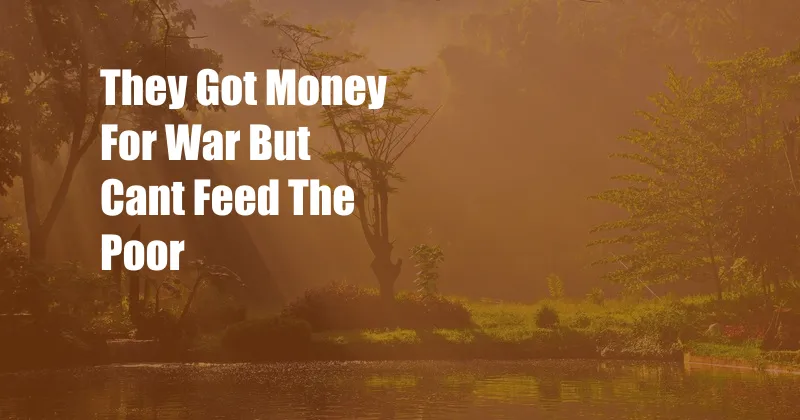
They Got Money for War But Can’t Feed the Poor
In the tapestry of human history, a glaring contradiction has persisted: the stark disparity between the abundance of resources allocated to destruction and the scarcity of aid extended to those in dire need. Governments and nations prioritize military expenditure, funneling billions into weapons and warfare while millions of people grapple with hunger, poverty, and disease. This jarring misallocation of funds raises fundamental questions about our collective values and priorities.
The sheer magnitude of military spending is both staggering and sobering. According to the Stockholm International Peace Research Institute (SIPRI), global military expenditure in 2021 reached an astronomical $2.1 trillion. This colossal figure represents an unprecedented level of investment in the tools and technologies of war. Yet, amidst this lavish spending, the plight of the poor remains largely unaddressed.
The Neglected Needs of the Poor
In stark contrast to the billions poured into military arsenals, the allocation of funds for poverty alleviation and social welfare programs falls woefully short. According to the United Nations Development Programme (UNDP), an estimated 767 million people live in extreme poverty, subsisting on less than $1.90 per day. This translates to over 10% of the world’s population living in abject deprivation, lacking access to basic necessities such as food, clean water, sanitation, and healthcare.
The consequences of persistent poverty are devastating. Millions of children suffer from malnutrition, stunted growth, and diminished cognitive development. Infectious diseases, preventable illnesses, and lack of access to quality healthcare claim countless lives each year. The cycle of poverty perpetuates itself, as those born into disadvantaged circumstances face insurmountable barriers to education, employment, and social mobility.
A Moral Imperative
The juxtaposition between lavish military spending and rampant poverty presents a moral crisis that demands our attention. It is a betrayal of our shared humanity to prioritize violence over compassion, to invest in weapons of destruction while our fellow beings lack the most basic necessities of life. The poor are not faceless statistics; they are individuals with inherent dignity, deserving of our support and assistance.
Addressing poverty requires a fundamental shift in our collective mindset. We must recognize that human security extends beyond military might and that true strength lies in the well-being of our citizens. Governments must prioritize social welfare programs, invest in education, healthcare, housing, and job creation. By empowering the poor and providing them with opportunities to improve their lives, we not only alleviate human suffering but also create a more stable and prosperous society for all.
The Role of Individuals
While governments have a primary responsibility to address poverty, individuals can also play a vital role. Charitable donations, volunteering, and advocating for social justice initiatives can make a tangible difference in the lives of those in need. By supporting organizations working to combat poverty, we become part of a collective movement for change.
Furthermore, it is essential to raise awareness about the plight of the poor and challenge the notion that poverty is inevitable. Through education and dialogue, we can dispel myths and stereotypes, fostering a greater understanding of the root causes of poverty and inspiring action.
Expert Advice
Experts in the field of poverty alleviation emphasize the importance of a comprehensive approach that addresses both the immediate needs of the poor and the underlying structural factors that perpetuate poverty. They advocate for targeted interventions that provide food assistance, healthcare, and shelter, while simultaneously investing in long-term solutions such as education, job training, and financial inclusion.
Experts also stress the need for accountability and transparency in the allocation and utilization of funds. Governments must ensure that resources are used effectively and efficiently, reaching those who are most vulnerable. Additionally, they encourage collaboration between governments, non-profit organizations, and the private sector to maximize impact and avoid duplication of efforts.
Frequently Asked Questions
Q: Why do governments spend more on military than on poverty alleviation?
A: Reasons for this disparity include historical precedents, perceived threats to national security, and political pressure from military-industrial complexes.
Q: How can we reduce poverty?
A: A multifaceted approach is needed, including government investment in social welfare programs, charitable donations, individual advocacy, and addressing the root causes of poverty.
Q: What are some common misconceptions about poverty?
A: Common myths include that poverty is a result of laziness, that the poor do not want to work, and that poverty is inevitable.
Conclusion
The words “they got money for war but can’t feed the poor” are not merely a slogan but a poignant indictment of our flawed priorities. It is time for us, as individuals and as a collective society, to demand a shift in resource allocation. We must invest in life, not death; in human security, not destruction. By redirecting our attention and resources towards poverty alleviation, we can create a world where everyone has a fair chance to live a life of dignity, free from want and deprivation.
Are you interested in learning more about the topic of poverty and its impact on society? Share your thoughts and questions in the comments section below, and let’s engage in a dialogue that can lead to positive change.